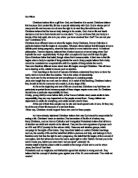In the second verse, Morgan starts to tell us about the man whose funeral it was and makes us think again about our sympathy, as he was clearly a violent man and perhaps does not deserve our pity. He starts the verse in a strange way, using the word, “bareheaded” at the start of the line, so bringing attention to it and emphasising the respect being shown, which, as we find out later, does not seem to fit with the kind of man being talked about.
Morgan then goes on to describe the life of poverty that that Billy Fullarton led, “brooding days of empty bellies, billiard smoke and a sour pint” tells us clearly that they spent their days in dingy pubs, drinking the same pint for hours because they couldn’t afford another drink or to go anywhere else. This explains somewhat the reasons behind the anger and violence that was the focus of their lives.
By using the word “the”, repeatedly when describing a fight, “the word, the scuffle, the flash, the shout” Morgan tells us that this is just one fight out of many, this starts to give us an insight into Billy Fullartons violent past. In addition, the use of commas and short words, which makes us read it quickly, helps to convey the urgency and speed with which it happened. Morgan also conveys the pointlessness and futility of the violence by making it sound repetitive and never ending “get the Conks next time, the Conks ambush the Billy Boys, the Billy Boys the Conks..” showing it was all a vicious circle that they seemed to be trapped in.
In the next part of the poem, Morgan manages to again change our ideas about Billy Fullarton by describing how he only had friends and admirers when he was a “local legend” and famous for his violent deeds. Morgan talks of how he was “lost in better days” and that he “died alone” in “box bed” showing that he was poor and friendless at the end of his life, making us realise that really, he is to be more pitied than hated.
After giving us this, lonely, depressing image, Morgan then gives us contrasting image by talking about “a thousand people” who “stopped traffic for the hearse of a folk hero”. Where were these people when he was poor and dying?
Morgan also tells us that the mourners “threw Onward Christian Soldiers to the winds, from unironic lips.” The only reason for using the word “unironic” here is to emphasis that they saw nothing wrong with being pious and religious about a man who was violent and used religion as an excuse for that violence.
Morgan ends the poem by asking us to stop and think. He is saying, yes, it is right to hate the things that Fullarton, and people like him, did but we should at least try to understand the reasons behind them. The poem says, “Go from the grave. The shrill flutes are silent, the march dispersed. Deplore what is to be deplored and then find out the rest”. The fact that only these last four lines rhyme is a clever way of emphasising their importance in what Morgan is trying to say.
This poem is very powerful, in that it makes us consider the pointless way of life for many young men in the 1930s, living through the depression and caught up in a cycle of sectarian violence that ultimately got them nowhere. It could be the story of any of these men. It tells us about religious differences being used as an excuse to fight, something that has gone on for hundreds of years, on all scales. The title compares a small time gang leader to King William of Orange, who fought to secure the British crown for protestant kings, and who many see as the embodiment of protestants triumphing over Catholics. By using the title “King Billy” Morgan compares these two men and shows us that perhaps people needed to believe that, by approving of the kind of man Billy Fullarton was, they were somehow supporting their faith against their “enemies” the Catholics, rather than just condoning mindless violence.







